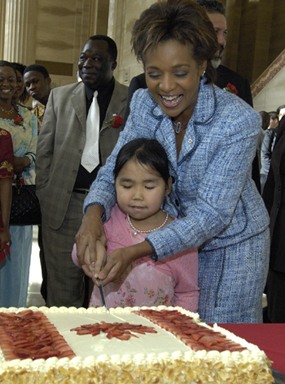If mandatory long-form census is against human rights, what about mandatory oath to offshore monarchy?
Jul 27th, 2010 | By Randall White | Category: In Brief
Who knows just what the lovely Ellen Page is opposing in this charming photograph? But it might be the current mandatory Canadian citizenship oath to Her Majesty the Queen, who lives in another country.
“So all we’re saying,” Treasury Board President Stockwell Day has urged in defence of the current plan to abandon the long-form census, “is this should not be mandatory.”
Canadians, Mr. Day believes, should not be compelled by the long arm of the law to “tell some unknown bureaucrat” about their home life, work, and ethnic origin, if their conscience urges otherwise. Ending such compulsion, other advocates for the minority government in Ottawa have added, is all about standing up against “tyranny” and for “human rights.”
On a first glance this may look like an impressive position of principle. But it would be more impressive if the current federal government also showed consideration for those who object to other mandatory confessions to unknown bureaucrats, on similar grounds of standing up against tyranny and for individual human rights.
In the 21st century, for example, to become a Canadian citizen you are still compelled by the long arm of the law to swear to some unknown bureaucrat, in the style of the European middle ages, that you “will be faithful and bear true allegiance to Her Majesty Queen Elizabeth the Second … Her Heirs and Successors.”
Candidates for citizenship are also required to “swear (or affirm)” that “I will faithfully observe the laws of Canada and fulfil my duties as a Canadian citizen.” And no one who is serious about becoming a Canadian citizen can object to this.
Yet many who passionately want to become citizens of the modern Canadian parliamentary democracy do object, as a matter of principle and human rights, to the current mandatory requirement of also swearing what amounts to personal feudal fealty to a hereditary offshore monarch in another country (and “Her Heirs and Successors”). So do many of us who are citizens already – and side with the majority of present-day Canadians, who recurrently tell opinion pollsters that they believe an independent 21st century Canada should end its historic formal ties with the British monarchy, at the end of the reign of Queen Elizabeth II.

Governor General Michaelle Jean presides over a ceremony to mark the 60th anniversary of the first Canadian Citizenship Act of 1947, held in Ottawa on February 16, 2007. Before 1947 Canadians were just “British subjects” who resided in Canada.
There are those who believe that, until such ties are ended by a constitutional amendment, new Canadian citizens are constitutionally required to swear an oath of allegiance to the monarch who lives in the United Kingdom. And it is true enough that, under section 128 of what we now call the Constitution Act 1867 (formerly the British North America Act): “Every Member of the Senate or House of Commons of Canada” and “every Member of a … Legislative Assembly of any Province” must swear such an oath before taking his or her seat in parliament.
Yet as Judge Edward Belobaba of the Ontario Superior Court of Justice spelled out in a decision of 2007: “There is nothing in the Constitution Act that requires a Canadian oath of citizenship or that a new citizen must swear allegiance to the Queen … in Australia, also a constitutional monarchy, new citizens are required to take a ‘pledge of commitment’ to ‘Australia and its people…and laws.’ This ‘pledge of commitment’ makes no reference to Her Majesty the Queen. In other countries, such as the United States, the citizenship oath requires the new citizen to ‘bear true faith and allegiance’ to the country’s constitution and laws, not to its president or head of state.”
As long ago as 1994 Judge Allen Linden of the Federal Court of Appeal spelled out further key reasons for objecting to compulsory citizenship oaths to the British monarch in the modern Canadian parliamentary democracy: “It may be argued that it strikes at the very heart of democracy to curtail collective opposition and incentive for change by demanding loyalty to a particular political theory … there was a time when criticism of the monarchy was viewed as treason … Nowadays, freedom to criticize the monarchy and other Canadian institutions is obviously guaranteed by the Charter … If the oath of loyalty permits one to demonstrate that loyalty to the Crown by advocating its abolition, what is the point of that oath?”
You would expect the present minority government in Ottawa to support these kinds of legal propositions too, if it altogether believed in the principles of human rights said to lie behind its opposition to the compulsory long-form census.
Instead it has aggressively opposed current efforts in the courts to make that part of the Canadian citizenship oath which relates to “Her Majesty Queen Elizabeth the Second … Her Heirs and Successors” (as opposed to “the laws of Canada and …Â my duties as a Canadian citizen”) strictly voluntary and “not mandatory.”
It almost makes you think the government’s position on the long-form census may not fundamentally flow from any point of principle at all. Instead it may just be intended to help mobilize a strategic minority constituency, that can bring significant enough electoral advantages in Canada’s present highly complex political system. It may even be most indebted to sordid political calculations, that let an executive supported by little more than a third of the Canadian people manipulate the levers of federal power, in ways democratic majorities often oppose.

